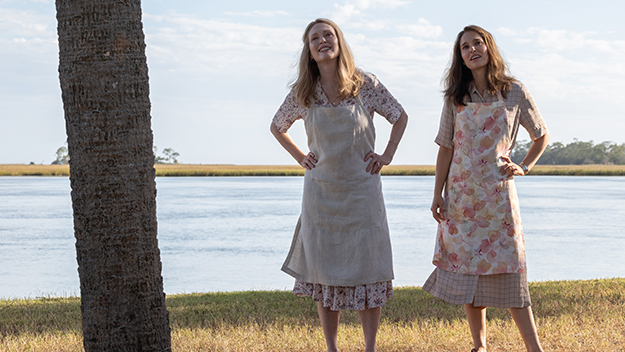Cannes 2023: In-Between Days
This article appeared in the May 23, 2023 edition of The Film Comment Letter, our free weekly newsletter featuring original film criticism and writing. Sign up for the Letter here. Catch up on all of our coverage of the 2023 Cannes Film Festival here.

May December (Todd Haynes, 2023)
At the close of the first week of Cannes 2023, Jonathan Glazer’s formidable fourth feature, The Zone of Interest, arrived like a deep wave of shivers. The quasi-experimental Holocaust film, Glazer’s first feature-length title in 10 years, is an adaptation of the 2014 novel of the same name by Martin Amis (who died of cancer at 73 on May 19, the day of the film’s premiere). But the book, which unfolds from the perspectives of three different characters—all infused with the author’s remorselessly bleak sense of humor—is quite unlike what Glazer has created here: less a narrative drama than a piece of ambient horror in which sound and obfuscation conspire to generate menace and unease.
Glazer sticks to one strand of the book, about the family of a Nazi commandant living next to Auschwitz, and draws the film closer to the real person who inspired that section—Rudolf Höss, the longest-serving head of the concentration camp. Cinematographer Łukasz Żal observes the home lives of Rudolf (Christian Friedel), his wife Hedwig (Sandra Hüller), and their young children with a clinical eye, employing unnervingly static frames that hold the characters, like dollhouse miniatures, at an anthropological distance. That not much “happens” in the film is precisely the point: Rudolf is temporarily transferred to another camp while Hedwig tends to the children and her precious garden with her team of servants. The atrocities happening beyond the wall are suggested—most pointedly by the careful sound design and Mica Levi’s throbbing score—rather than directly visualized, mirroring the characters’ horrifying insularity. A stream of smoke peeking over a barrier or the red glow of a distant pyre appear like eruptions of the subconscious amid scenes of bucolic leisure and cozy domesticity.
As in his previous work, Glazer defamiliarizes the ordinary (the conceit of 2013’s Under the Skin is quite literally the construction of an alien point of view), immersing us in the routines of a bourgeois existence that by all appearances is, but never truly feels, quaint and unremarkable. What sets The Zone of Interest apart is its relationship to history and historical representation; a central dilemma of Holocaust cinema pits the responsibility of bearing witness against the medium’s penchant for aestheticization—to paraphrase Serge Daney, what could be more revolting than a handsomely framed corpse? Glazer’s choice to withhold, rather than to depict, is a moral one, a refusal to make seductive that which can never be understood—and which should remain an unimaginable calamity. Instead, Glazer aligns the film with the perspective of those complicit, who are struggling, but desperately failing, to keep the demons at bay. If this psychological setup isn’t particularly original, the film’s queasy rhythms are undeniably effective, generating a bodily experience that insists on more than meets the eye.
Among betting critics here on La Croisette, Zone is a contender for the festival’s top prize, not least because of the heft of its subject matter and its muscular approach. In comparison, Todd Haynes’s May December is a deceptively pleasurable watch that proves to be equally intrepid in scope and ambition—and it also, in a sense, refuses to look directly at the sun. Here, obliqueness is both a coping mechanism and a means of creativity. Natalie Portman plays Elizabeth Berry, a deliciously phony actress conducting research for a part in an upcoming film, playing the kind of problematic woman role that is easy fodder for attention and acclaim. That it’s based on a true story is the cherry on top for Elizabeth—and likewise for Haynes and screenwriter Samy Burch, who draw inspiration from the case of Mary Kay Letourneau, the schoolteacher who became the subject of one of the great public scandals of the ’90s when she, at age 34, was arrested for having an affair with her 12-year-old student, whom she eventually married.
We meet Julianne Moore’s Gracie Atherton-Yoo around 20 years after her imprisonment for having sex with a minor; she now lives a seemingly idyllic married life with her onetime underage lover, the now-36-year-old Joe (Charles Melton), and their three kids. Elizabeth has been cast as Gracie in a movie about the scandal, and throughout May December, she relentlessly probes the woman and her family for meaty revelations that might help unearth her character’s “truth.” Bluntly self-interested, Elizabeth takes pleasure in the hunt, her detective games challenging the illusions that Gracie and Joe have created for themselves even as Elizabeth constructs a version of Gracie that proves increasingly imprecise. Haynes regular Moore is in top form as the fragile yet distressingly delusional housewife, and Melton—who first shot to fame with his turn on the guilty-pleasure CW series Riverdale—also brings a tremendous vulnerability, veiled by a thin armor of brawny masculinity, to the stunted Joe. The film is a balancing act of grueling sincerity and droll artifice, insisting on the possibility of multiple truths, and subverting easy moralism and the reductive characterizations that turn people into objects of tabloid fascination.
Similar concerns are at play in Justine Triet’s courtroom drama Anatomy of a Fall: “I don’t give a fuck about reality,” Swann Arlaud’s defense attorney declares at one point in the film, reminding his client Sandra (Hüller again, here a shoo-in for the festival’s Best Actress prize) that trials aren’t won by mere facts. Triet’s previous efforts (including 2019’s Sibyl and 2016’s In Bed with Victoria) were semi-screwball character studies with hints of psychological suspense, but Anatomy of a Fall is a major departure for the French filmmaker, whose inspired take on a familiar genre exhibits a new level of directorial assurance. The film plumbs the emotional intricacies of the relationship between two married artists, jumping off an intrigue not terribly unlike the plot of Basic Instinct (1992), in which Sharon Stone’s Catherine Tramell, an accomplished writer of murder mysteries, is accused of a killing that resembles a story in one of her books.
Hüller’s Sandra is a German novelist living with her husband and son in a remote chalet near Grenoble. In the jarring opening, Sandra’s interview with an admiring student is cut short by her husband, a less successful writer, who starts playing a deafeningly loud (and eminently memorable) instrumental version of 50 Cent’s “P.I.M.P.” on loop. Their 11-year-old, Daniel (Milo Machado Graner), returns from a walk to find his father’s corpse oozing blood outside their home, presumably after a fall from the attic window. When the facts don’t quite add up, Sandra becomes the main suspect. The film proceeds chronologically through the investigation and the trial, but Triet twists the truth-seeking format in beautiful, invigorating ways: Daniel, the key witness, is blind, and as such his judgment is determined by his sense of sound and his gut feelings as he tries to understand his parents’ relationship—manifested in all its warped cruelty as recordings of their violent arguments and passages from their books are presented in court as evidence. Sandra, Daniel, and even the family dog, Snoop, emerge as figures of startling complexity, resisting definition, just as the film eschews moral certainty. In the finale, Triet reminds us that ambiguity may be human, but authority is the linchpin of good art—facts are up to interpretation, but choices determine the course of a narrative as well as the trajectory of our lives.
Beatrice Loayza is a writer and editor who contributes regularly to The New York Times, The Criterion Collection, Artforum, 4Columns, and other publications.







